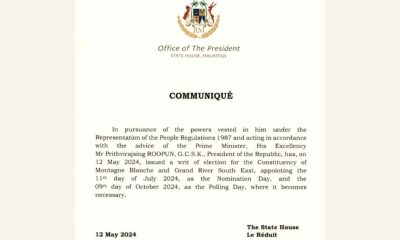News
Bad Weather Confusion: Can Your Boss Force You To Work?

For once, apart from civil servants, employees in the private sector also received directives from the National Crisis Committee (NCC), telling them not to go to work on Monday, April 22nd.
While many celebrated this unexpected day off, some faced confusion as their bosses called them back to work when the weather improved.
What does the law say in this case? Is it allowed to force an employee to come to work? To deduct from their local leave if they choose not to go?
In fact, there is still no legal framework to clearly define employing conditions in the event of torrential rains or inclement weather that have made roads impassable, for example, unlike cyclone alert level 3 where the population must remain confined.
Up until now, the procedure involved the government announcing directives for civil servants and letting Business Mauritius decide on the conduct for the private sector.
It should be noted that the NCC, under Article IV of the 2016 National Disaster Risk Reduction and Management Act, is still mandated to take necessary measures to protect the population from potential dangers.
On Monday, April 22nd, even though the weather improved and all alerts were lifted, the directive not to go to work was still in effect.
While for many, the instructions were clear and followed, some found themselves in a difficult situation, forced to go to work without their knowledge.
Absence during cyclone alert level 3
In the event of a cyclone alert level 3, it is well established that employees do not go to work, eliminating any confusion and allowing everyone to know their rights and duties.
When a cyclone alert of class 3 or 4 is issued, all employees, except those in emergency services, have the right to be absent, as this is a case of force majeure.
This absence allows them to stay safely at home without the risk of sanction or loss of salary.
Their employer must therefore pay them at the regular rate during the alert period. “However, some employees, especially those in essential services, may be required to work even during these alerts, given the crucial nature of their functions.
In these cases, Article 32 states that those who work during a class 3 or 4 alert must be compensated at a rate equivalent to three times their normal base rate,” explains a lawyer.
Furthermore, if an employee chooses not to report to work during a cyclone alert, even if they are part of essential services, they should not be penalized and will be paid at the regular rate for the period of absence.
This provision protects employees who, for reasons of personal safety or logistics, cannot go to their workplace.
In 2020, the Workers’ Rights Act was amended by the Covid-19 (Miscellaneous Provisions) Act to include Article 17A, that is, work from home, a provision strengthened in 2023.
Furthermore, according to Article 32 of the law, which deals with compensation in other specific circumstances, part (1A) states that during extreme weather conditions, including heavy or torrential rains, although this part also provides for work in the case of torrential rains, it remains unclear and open to interpretation.
But one thing is clear: the employer cannot expect an employee to show up to work or continue working in extreme weather conditions.
In contrast, civil servants have a Heavy Rainfall Protocol that clearly outlines what to do in such cases.
Compensation and deducted leave
Unionist Jane Ragoo from the Confederation of Public and Private Sector Workers (CTSP) highlights that the NCC statement is very clear and the directive not to go to work applies to all sectors.
“We need to clearly define what essential services are. That’s where the confusion lies. In the same statement, it is asked not to go out, then it is mentioned that some services are essential, and then it is said that some services, although non-essential, can open but with maximum precautions.
At CTSP, we have received several calls from employees whose employers asked them to come to work despite the statement.
We advised the workers not to go and for essential services, we requested transportation facilities,” explained Jane Ragoo.
Employees who chose not to go to work were faced with the question of compensation or deducted leave.
Once again, in the absence of clear legislation, employers would have the upper hand. “We are faced with the problem of deducting local leave for those absent.
We cannot accept a double standard policy. Health and safety before profit because human life is priceless.
We have made progress, but the communicated decisions should be more elaborate as some employers only think about profit,” insists the unionist.
Essential services… floating
The definition of essential services varies depending on circumstances and societal needs, as seen in various crises.
During the Covid-19 pandemic, services considered essential included law enforcement, medical services such as hospitals and clinics, firefighters, as well as critical infrastructure such as ports and airports.
Subsequently, the hotel sector was added to accommodate tourists unable to return home with closed borders and travel restrictions.
More recently, garbage collectors have joined this list. Despite inclement weather and office closures, these workers continue to ensure the cleanliness and hygiene of cities.
Another debate arose when supermarket employees were asked to continue working despite the NCC ordering the closure of non-essential businesses.
This raises the question of whether supermarkets should be considered essential. The lack of a clear and precise list of essential services causes confusion and difficulties in times of crisis.
A few testimonies on Facebook…
C. S.: “There is no clear law and with this ‘work from home’ and in this situation we need to use it… Where there is insertitid there is abuse and disorder.”
A. V.: “Tonight they say there is no work. In the morning at 6 am the boss says you have to come to work, otherwise your attendance bonus will be cut. The private sector says that on that day they will cut from the local. “
A. L.: “What does it mean saying private and public sector stay at home, malls are open, people don’t have the right to go out. I don’t understand this logic… the way malls are becoming essential services now.”
Source: l’Express











